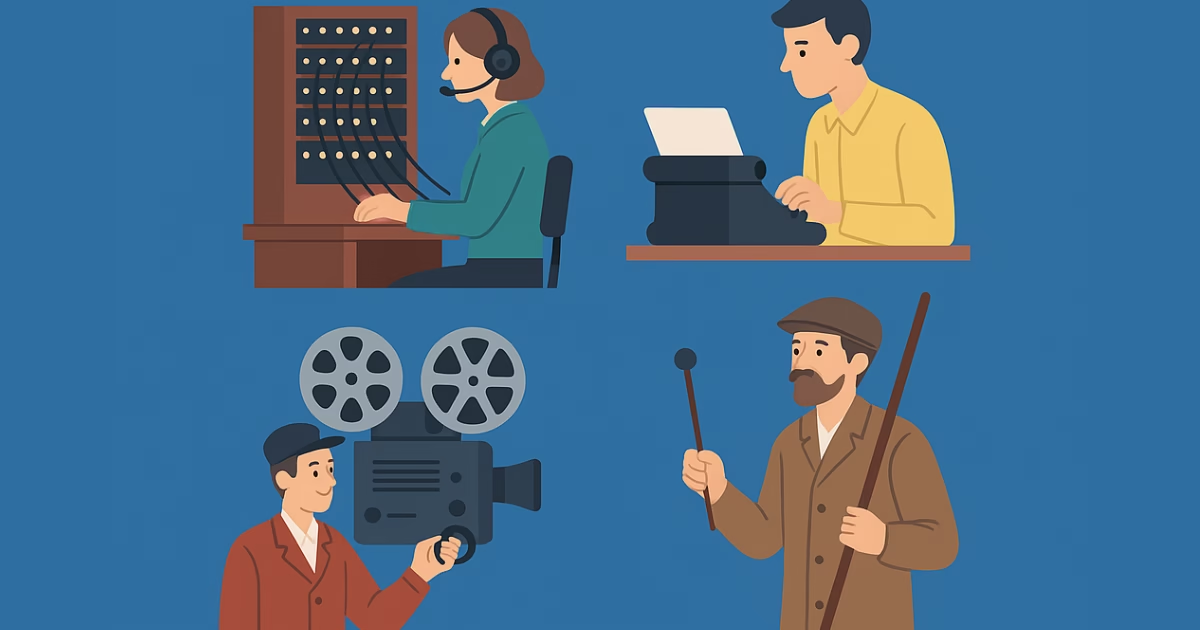Technology has changed the way people live, communicate, and work. Over the last few centuries, many professions have simply disappeared as machines and new systems took over tasks once done by humans. While some of these changes made life easier, they also meant the end for several traditional careers. Today, it is hard to imagine that there were once workers whose only job was to light street lamps or manually connect telephone calls.
As industries grew and new inventions came along, countless examples appeared of jobs that no longer exist due to technology. Understanding this transformation helps explain why certain skills become outdated while new ones rise to take their place. In this blog post, we’ll explore how innovation shaped the modern workforce by looking at the jobs we have lost — and what that says about the future of work.
Understanding Jobs That No Longer Exist Due to Technology
Throughout history, every major wave of invention has reshaped the way people work. During the Industrial Revolution, machines replaced tasks that used to require human hands. Later, computers, the internet, and robots continued that trend, changing industries at an even faster pace.
Many jobs that no longer exist due to technology were once vital to everyday life. For example, in the early 1900s, switchboard operators connected every phone call manually. Without them, communication would have been slow and chaotic. Today, smart networks handle everything automatically without the need for human help.
The same pattern happened in many industries. Jobs disappeared not because people failed, but because machines simply became better, faster, and cheaper. As technology improved, companies preferred automated systems that could work around the clock without getting tired or making mistakes. This shift didn’t just erase old roles; it created whole new types of work too.
20+ Jobs That No Longer Exist Due to Technology
As technology marched forward, many once-important jobs disappeared. Here’s a list of careers that faded away due to machines, automation, and innovation:
Switchboard Operators
In the past, switchboard operators manually connected calls. Today, automatic systems do it all without any human help.
Human Alarm Clocks (Knocker-Ups)
Before alarm clocks, people hired “knocker-ups” to wake them by tapping on windows. Modern alarms ended this unique job.
Typists and Word Processors
Big offices once needed full rooms of typists. Computers and word processors replaced them quickly.
Film Projectionists
Projectionists once handled movie reels in theaters. Now, digital projectors and automatic systems have taken over.
Elevator Operators
In early skyscrapers, elevator operators were needed to run lifts. Today, elevators are automatic and self-service.
Milkmen
Daily milk deliveries were common, but home refrigeration and supermarkets made the milkman’s job unnecessary.
Bowling Pinsetters
Kids used to reset bowling pins by hand. Automatic pinsetters now do it faster and safer.
Lamplighters
Before electric lights, lamplighters lit street lamps each night. Electricity removed the need for this role.
Telegraph Operators
Sending messages once needed trained telegraph operators. Phones, emails, and messaging apps ended this career.
Log Drivers
Log drivers moved timber down rivers by balancing on logs. Trucks and trains now handle the job.
Ice Cutters
Before refrigerators, people harvested ice from lakes. Modern freezers put an end to ice cutting.
Typographers
Typesetting text for newspapers and books was a skillful job. Now, digital printing does it with ease.
Travel Agents (Partially)
Many travelers now book flights and hotels online. While some agents still exist, the need has dropped a lot.
Video Store Clerks
Renting movies from stores was huge in the 90s. Streaming services like Netflix made this job disappear.
Encyclopedia Salespersons
Selling encyclopedia sets door-to-door was once common. The internet made information free and easy to find.
Newspaper Typesetters
Before digital publishing, newspapers relied on typesetters. Modern software replaced this craft entirely.
Switchboard Supervisors
Managing a team of switchboard operators was a big job. Like operators, supervisors were also replaced by new tech.
Library Card Catalog Workers
Libraries once used card catalogs for finding books. Digital systems made this method old-fashioned.
Projection Booth Technicians
Running film projectors needed skilled technicians. Today’s digital projectors require much less human work.
Bank Tellers (Partially)
ATMs and mobile banking have reduced the need for many teller positions. Some still remain but far fewer than before.
How Technology Continues to Change Careers Today
The wave of change isn’t slowing down. New inventions like AI, robotics, and smart software are already reshaping today’s jobs. Self-checkout machines have replaced cashiers. Apps have taken over many personal assistant tasks. Even legal and medical industries are seeing computers doing work once handled only by trained professionals.
As businesses look for faster, cheaper, and more reliable options, more roles will keep disappearing. While it’s a little scary, it’s not all bad news. Every time technology closes a door, it often opens a new one.
Is Losing Jobs Always a Bad Thing?
At first, losing a job to technology feels like a bad thing. People lose their income, skills feel useless, and communities change. But looking deeper, history shows that new kinds of jobs usually come along to replace the old ones.
For example, when factories introduced machines, they needed workers to build and fix them. Today, fields like software development, cybersecurity, and data analysis didn’t even exist a few decades ago. They offer exciting opportunities that older generations could hardly imagine.
Upskilling and learning new technologies are key to staying ahead. Change is tough, but it also leads to growth, better working conditions, and sometimes even more creativity at work.
Can We Predict Which Jobs Will Disappear Next?
Predicting the future isn’t easy, but some trends are clear. Jobs that involve simple, repetitive tasks are at high risk. Think cashiers, telemarketers, or even basic data entry roles. Machines are getting better at these kinds of work every day.
Industries like transportation could also change fast with self-driving cars and trucks. Warehouses may soon run almost fully on robots. Some writing and design work could also shift thanks to AI tools.
The best way to prepare? Stay flexible, keep learning, and be ready to jump into fields that need creative thinking, emotional skills, or technical expertise. Those are the qualities that machines still can’t fully copy.
Also Read: Top Dangerous Jobs in the World: Risky Careers Revealed
Conclusion
The world has changed a lot, and technology is a big reason why. Many jobs that no longer exist due to technology were once seen as vital. Today, we barely remember some of them.
While it’s hard to see jobs disappear, history shows that people always adapt. New industries are born. New careers are created. Skills evolve. It’s important to keep learning and stay ready for what comes next. After all, the story of work is really the story of human creativity, survival, and endless possibility.
FAQs About Jobs That No Longer Exist Due to Technology
1. What are some examples of jobs that no longer exist due to technology?
Jobs like switchboard operators, lamplighters, milkmen, and human alarm clocks have all disappeared because of new technology.
2. Why do jobs disappear when technology advances?
Technology often replaces human work because it can do tasks faster, cheaper, and more accurately than people can.
3. Is it possible for new technology to create more jobs?
Yes, history shows that while some jobs vanish, new industries and careers usually appear to take their place.
4. Which jobs might disappear next because of technology?
Jobs involving simple, repetitive tasks, like cashiers and telemarketers, are most at risk as automation improves.
5. How can workers prepare for future changes in technology?
Learning new skills, staying flexible, and focusing on creative or technical roles can help workers stay ready for the future.

Hi, I’m Shafy Ali – a curious mind and passionate writer at Celiac Magazine. I cover a little bit of everything, from everyday tips and how-tos to deeper dives into topics that spark conversation. I enjoy turning research into readable, relatable content that informs and inspires. Whatever the subject, I aim to keep it clear, engaging, and genuinely useful.

